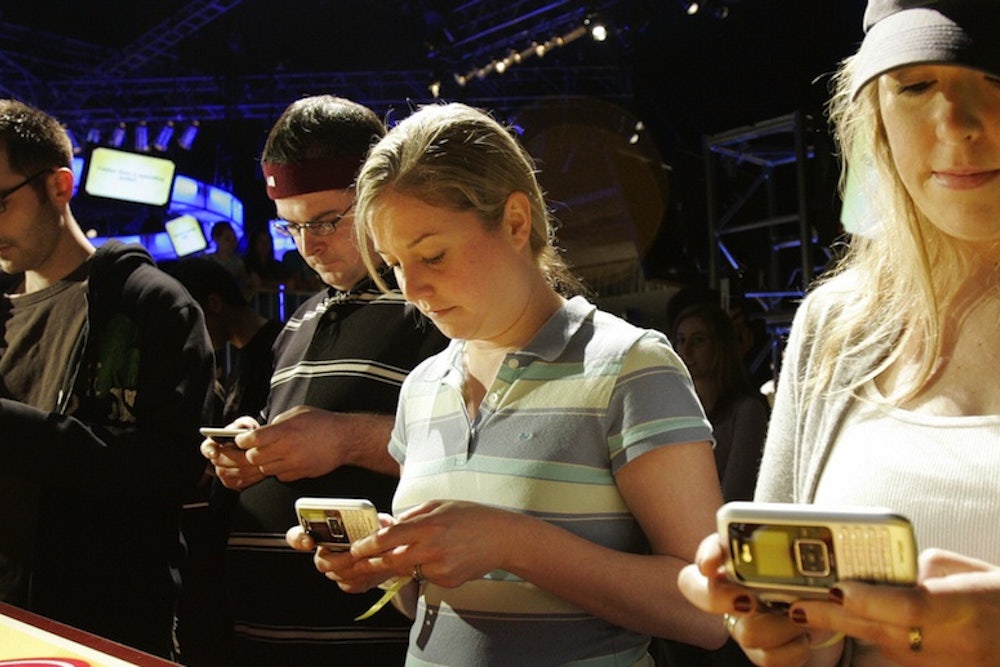We hear so much about how English is going to the dogs. But I'm having a hard time seeing those dogs of late. In the way young people are texting, tweeting and just plain talking, I see, of all things, warmth. American English is getting sweeter all the time.
Take the peculiarly witty locution that the American Dialect Society just anointed as the word of the year, the new because. It is now acceptable, at least in tweets and such, to write things like “I stayed home because weather,” “I just eat them by the handful because chocolate,” and “Dow closes at record high for 35th time this year because Obama.”
Some have suggested that this new usage hotly insists that something is “a completely valid incredibly important thing to be doing.” However, that one doesn’t really work for things like the weather, or “Going to bed at nine because tired.” What all of these usages of the new because have in common is that they imply that the reader shares the same specific, many-layered feeling about the thing referred to—i.e. the particular joy of chocolate or the particular state of the weather at a given time and what the proper responses are to it.
That is, the new because is about the mental nuances that we all have in common. It reaches out—the linguistic expression of a lifted eyebrow, a stretched out vowel (think Homer Simpson’s “Mmm, chahhhhhh-colaaaate …”), or a touch on the arm. It’s a substitute in text messages for things like facial expressions, vocal intonations, and body language. But because texting is a more deliberate activity than casual speaking, people can be more pointedly expressive than they might in a face-to-face conversation.
The famous LOL is similar. No longer just a literal acronym for “laughing out loud,” it now decorates texts in a way that seems random, but in fact solicits affirmation of common sentiment. “I’m in the library lol” in a student’s text doesn’t mean that there is something rib-tickling about the statement, but that the reader knows the drudgery of being in the library rather being somewhere else.
Comfort is the goal. Look at people’s LOL-ing and notice that the LOLs occur about exactly where, in natural conversation, giggles and quick, punctuating laughlets would come. That kind of laughter is social glue—LOL warms texts up; just like the new because.
None of this is so unusual in view of other aspects of how young Americans have long been just talking, even before there was texting or tweeting. Take good old like, as in “He was, like, the only one there.” It inserts a note of hesitation, cushioning what the speaker seems to feel would be an overly assertive observation. Many people use this like so much that we are forced to suppose that they are wary of assertion in general, not just regarding the occasional sentiment. But: This wariness of assertion can also be read as an awareness of the complexity of life, as a generation’s having actually internalized what higher education is designed to impart, an awareness that truth is elusive.
The high-school cafeteria form of like can be seen, then, as evidence of broader philosophical horizons. It might hearten some, in that vein, to know that many European languages have an equivalent to like lately—in French it’s genre, in Russian značit. If you know either of those languages, take a listen to someone under 30 speaking and you’ll catch lots of both. In any case, this like is ultimately just plain nice. “They, like, hate you!” is a kinder, gentler way of saying that to someone than “They hate you!” “It was, like, a party!” is a way of saying that you understand that opinions may differ on just what constitutes a party and even whether the resemblance was a good thing.
There is always so much hiding behind what sounds like verbal bubble gum. One more is the youthful use of totally. “I’m totally buying tickets” does not, in fact, mean the same thing as “No, I really am buying tickets.” It carries an implication that there has been, in earlier conversation or just via assumption, some resistance to what you are asserting. “I’m totally buying tickets” means “I’m buying tickets despite the fact that you could think of the show as cheesy”—one imagines a Spice Girls reunion. “Oh, he’s totally an Albanian”—that means “Despite evidence to the contrary which we may have discussed or which we may perceive without mentioning it, he is an Albanian.”
Totally politely acknowledges objections while asserting—more gently than a more overt equivalent like regardless—one’s own decision or conclusion. It’s no accident that totally can be combined with like—“I’m like totally buying tickets” is actually double-stuff sweetness. This linguistic politeness sits so deep in young America’s soul that of course totally is now often shortened and isolated into the interjection Totes!
With snark so popular as well, it can be hard to see, but we know that there is a fundamentally empathic nature in the heart of young America—because like, LOL and totally.
